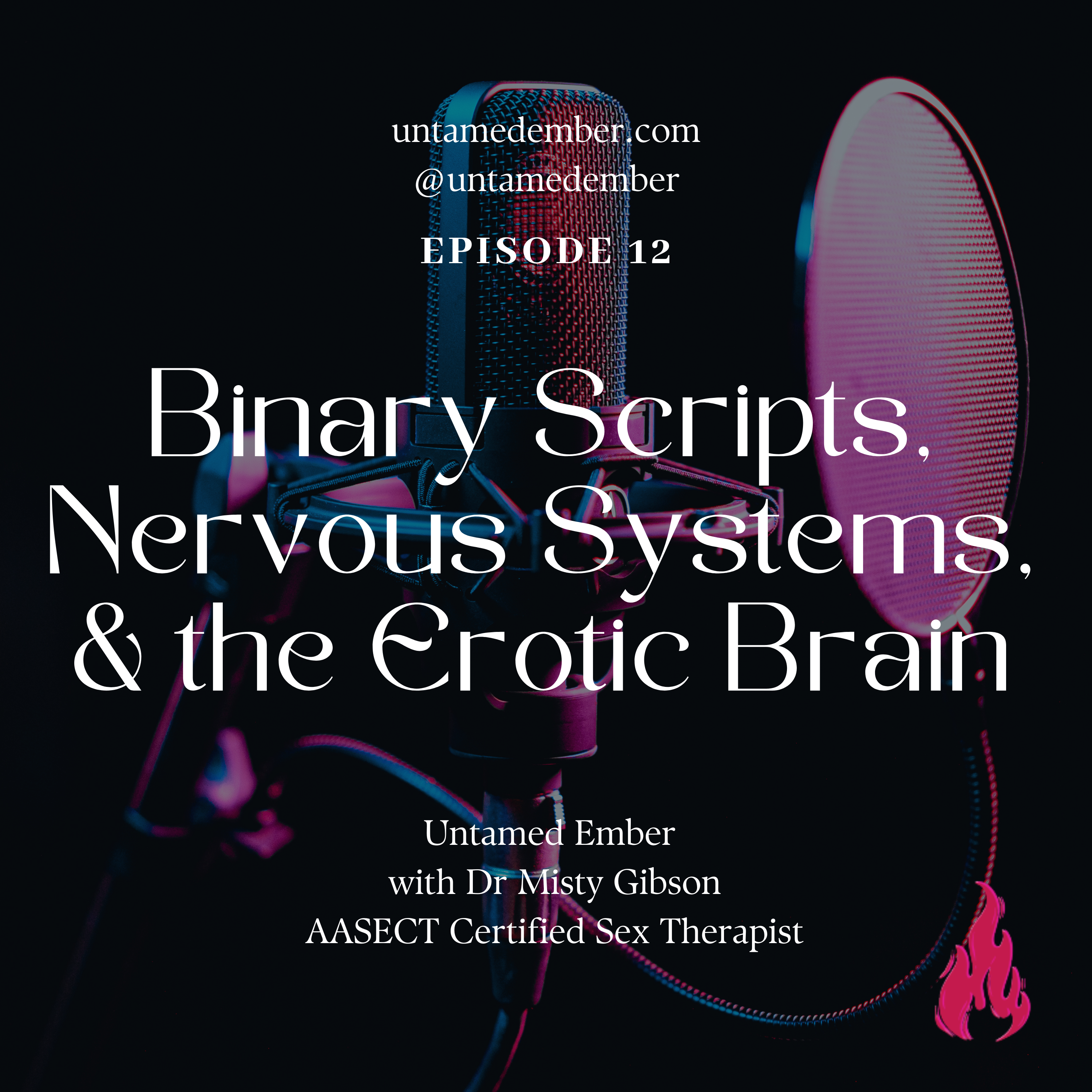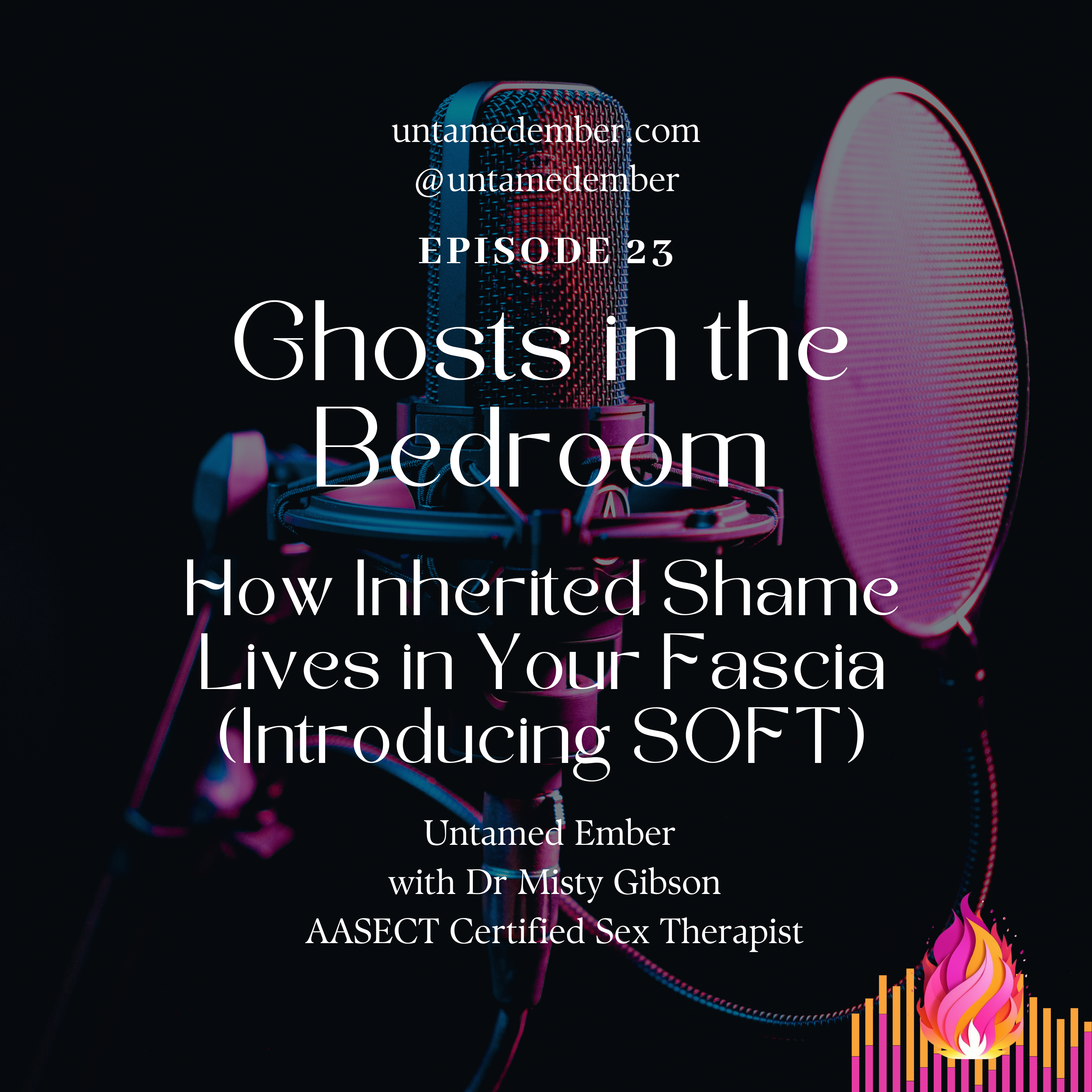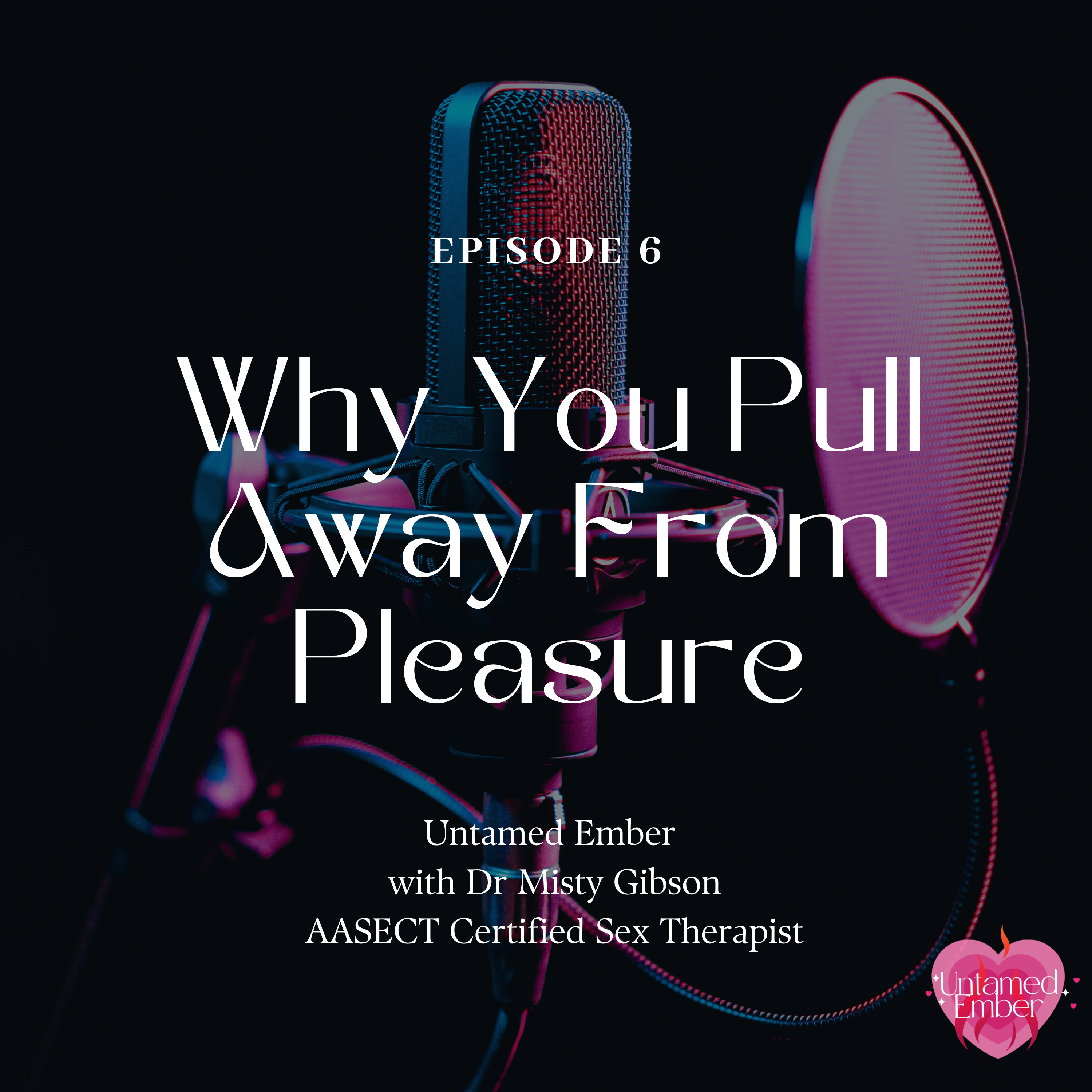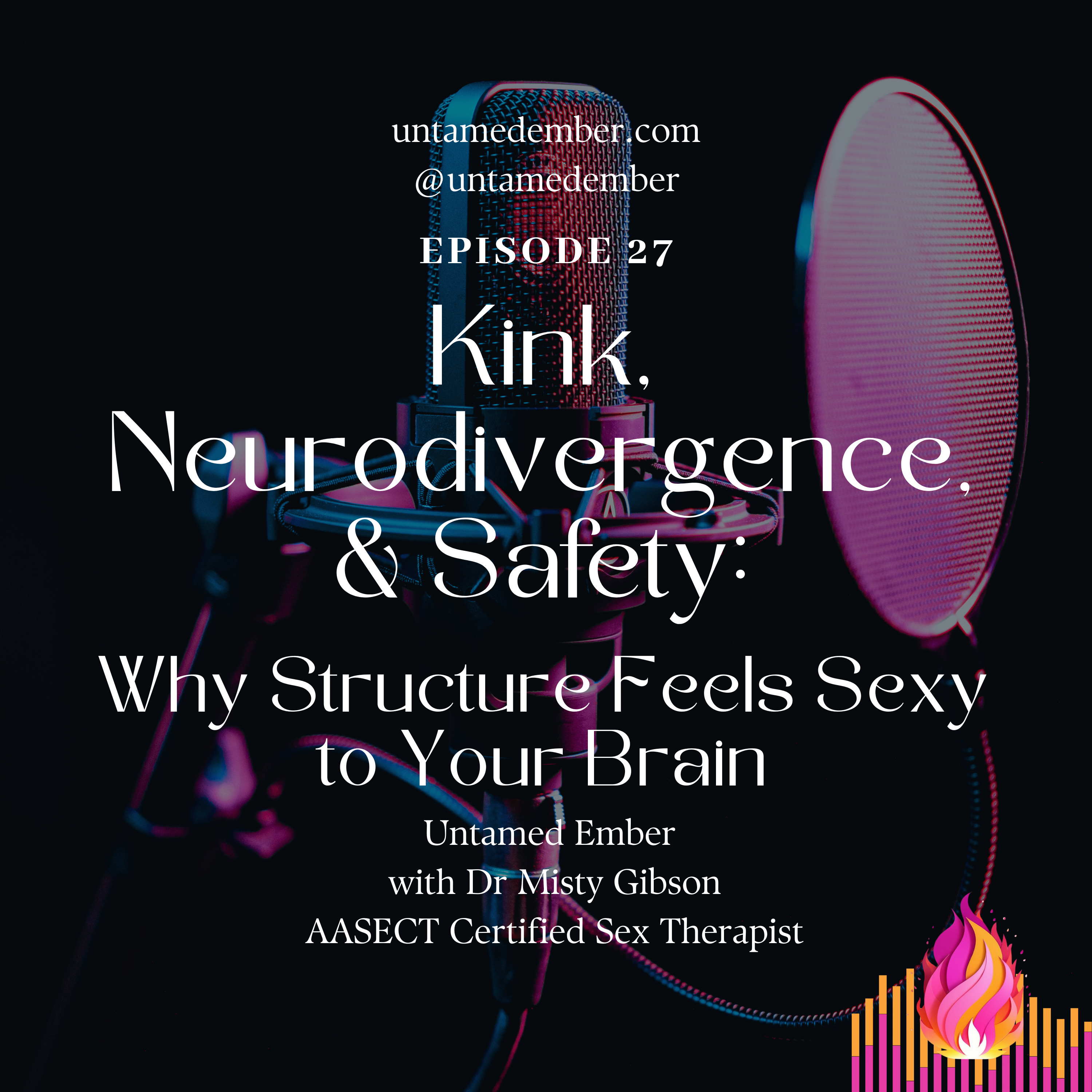Episode Transcript
[00:00:00] Your brain doesn't give a shit about whether you're masculine enough or feminine enough. It cares about safety, stimulation, and whether it's been allowed to want anything at all. And yet here we are, trying to force our erotic selves into binary roles that were never designed for real people, let alone real pleasure. We're told to be dominant or submissive, a giver or a receiver. Confident but not intimidating, sensual but not needy. And then we wonder why our bodies don't show up for the performance. Spoiler. It's not you, it's the damn script.
[00:00:42] Hey love. Welcome back to Untamed Ember, the podcast where we get real about sex shame and why your ex was probably the problem. I'm Dr. Misty, sex therapist, erotic liberation nerd, and the part of your brain that just screamed, can we not? This week we're going deep into your erotic brain. We're talking about how binary messaging confuses your nervous system and what arousal actually looks like in the body. And how ditching the script might be the sexiest and most healing thing you've ever done. Let's get into it.
[00:01:19] Alright? Let's talk about what's actually happening in your brain when it comes to desire. Because I promise you, it's a lot less alpha male versus submissive vixen and a lot more does my nervous system even feel safe to be here right now? Desire is a whole body, whole context, relational process. It doesn't just light up because you followed some script about who's supposed to initiate or who's supposed to be in control. This the brain's arousal systems are wired around four major safety novelty, stimulation and attunement. Now let's go deeper into each safety. Without it, nothing else matters. Your brain is constantly asking, am I safe enough to let go? That doesn't mean logically, like do I trust this person? But viscerally, safety in the erotic brain means I don't have to perform. I don't have to monitor someone else's feelings. I don't have to override my nose to be loved. When you're in a sexual dynamic that's forcing you into a role. Be the initiator, be the dominant, be soft, be sexy. You're spending all your mental energy monitoring expectations. That puts your nervous system into a cognitive override mode from a polyvagal lens. You're not in the ventral vagal state where pleasure lives. You're likely in the sympathetic activation fight or flight or dorsal freeze and shut down. And sex from that state is basically glorified people pleasing now let's talk about novelty and how that ties into your erotic wiring. Emily Nagaski's dual control model tells us that desire lives in two systems. An accelerator turned on by anything arousing. Sounds, images, touch, connection. And a brake turned off by anything threatening, stress, shame, pressure or scripts. And here's the deal. Binary sexual scripts almost always hit the brakes. They feel predictable, narrow, and emotionally mismatched. Your brain wants a surprise. It wants novelty. Not necessarily new partners, but new permission. And when you're stuck in a this is what a woman does or this is how a man initiates dynamic. Your accelerator never gets to play. It's just the brakes all day, baby. Stimulation is not just about touch. It's about neurochemical engagement. Your brain wants dopamine and oxytocin and serotonin. It wants things that feel exciting and emotionally safe. But when you're stuck in a performance loop trying to look sexy instead of feel sexy, you disconnect from the feedback loop that your body actually needs to create those chemicals.
[00:04:04] For neurodivergent folks especially, sensory experiences are more nuanced. The texture of breath, tone of voice, smell, pressure of touch. All of these play a role. And binary scripts tend to push a specific formula. Rough equals masculine. Slow equals feminine. Initiating equals strong. Receiving equals submission. The that flattens the whole damn spectrum of possibility. And let's get into attunement. This is one that actually gets overlooked constantly. Attunement means being emotionally and energetically in sync with someone. It's the ability to sense when your partner is disconnected or when they're really present. And that means naming what's real, even if it's messy listening instead of assuming noticing someone's shifts in breathing or in posture. Binary roles often interrupt attunement because they make assumptions. They create expectations. They say this is what you're supposed to want instead of what are we co creating right now? And when there's no attunement, your nervous system starts buffering. Like an old modem, pleasure cannot load and one last nerdy hit before we transition. The default mode network is the part of your brain that lights up during rest, daydreaming, and imagination. It's also deeply involved in erotic fantasy, identity and self reflection. But here's the catch. If you've spent your life masking, if you've been trained to prioritize other people's comfort, to follow rigid gender expectations, or to express the version of you that feels acceptable, you may struggle to access the space. And that matters, because imagination is part of Arousal. If your erratic brain has only ever been allowed to imagine through the lens of binary roles, or pornified scripts, or trauma, informed suppression, you may not even be able to access your own pleasure blueprint without doing some serious unmasking first. When your nervous system doesn't feel safe, your brain hits the brakes. You could be with someone you love, someone you trust. But if your body doesn't feel like it can let go, desire shuts down. And what kills that sense of safety faster than anything? Having to perform a role that doesn't fit. Having to stay in your head, manage the other person's experience, or override what you really feel. That's why binary sexual scripts like this is what a man does or this is what a woman wants. Those aren't just limiting, they're dysregulating. They force you to prioritize performance over presence. Let's bring in the polyvagal theory for a sec. When you feel connected and safe, your body is in what's called the ventral vagal state. That's where pleasure lives. That's where curiosity, play and turn on can actually show up. But when you're stuck in a role, especially one that feels wrong, you're more likely to shift into fight, flight or freeze. Your body might go through the motions, but your nervous system has already left the room. Add in dopamine, our novelty seeking, motivation driving neurochemical, and here's what happens when you already know how the scene is supposed to go. Who leads, who reacts, who finishes first. And there's no surprise. No buildup, no tension. Just predictable performative sex and dopamine. She is bored. For neurodivergent folks, especially, this binary chemical can feel claustrophobic. Our sensory systems don't always respond the way we're told they should. We may need more time, more variety, less pressure, different cues. Trying to fit into a standard turn on pattern doesn't just feel uncomfortable, it can feel impossible. And the more we try to force it, the more our bodies go offline. So yeah, the problem isn't that you're not in the mood. The problem is you've been trying to feel desire inside a system that was never built for your brain.
[00:07:57] So now we've nerded out on what your erotic brain actually needs. Safety, novelty, attunement and stimulation. Not rigid gender roles or performative scripts. And even though we can explain all of that with neuroscience, it's the lived experience that really brings it home.
[00:08:18] I want to tell you about someone I've had the privilege of helping through something Similar. Not by name, of course, but with their full permission to share this part of their story. Because it perfectly captures what happens when your body knows the binary script isn't working, even if your brain hasn't quite caught up yet. This person, let's call her Em, came to me after years in a long term monogamous relationship with someone that she genuinely cared about. There wasn't abuse or chaos. It wasn't explosive or dramatic. It was just quiet, predictable. On paper, it looked like a healthy relationship, but Em was unraveling. In the silence. She told me there was this moment she was brushing her teeth and looking at herself in the mirror, and she suddenly had this thought. I don't know who I am when no one needs anything from me. That thought followed her to bed. She could do all the things. She could say yes, show up, get through it, even orgasm sometimes. But she wasn't in it. She was performing a version of desire that looked believable but felt hollow. And the more we unpacked it, the more it became clear her sex life had become a performance of emotional labor. She wasn't initiating because she was turned on. She was initiating to prevent distance. She wasn't saying yes because she was in her body. She was saying yes because it was easier than trying to explain the fog. Em had spent so long being the emotionally competent one, the intuitive one, the one who knows what other people need before they even say it, that she never even noticed how disconnected she became from what she actually needed. And that script didn't stop at communication or caretaking. It followed her into every sexual interaction. She told me I'd get touched and immediately start thinking about what the other person wanted. Whether I was responding the right way, whether I should moan or say something or flip us into the next position. I wasn't thinking about what felt good. I was thinking about how I was being received. That's when it actually hit her. She wasn't actually having sex. She was managing an experience in her erratic brain. It knew she wasn't in a space of curiosity or play or turn on. She. She was in cognitive override. Her nervous system couldn't soften or drop in because it was too busy scanning for expectations. And then here's the kicker. Em didn't come to me because she was in a crisis. She came to me because she missed herself. She missed being curious. She missed the fantasy space she used to disappear into. She missed being surprised by her own desire. And most of all, she missed feeling like sex belonged to her. I think a lot of Us know exactly what that feels like, even if we don't have words for it yet.
[00:11:09] And before we move on, I want to pause here to speak directly to my queer listeners, because what we're talking about today isn't just a heteronormative issue. Yes, a lot of these roles are easiest to see in straight relationships, but they are absolutely present in queer ones too. And sometimes they're even trickier to name because they're not supposed to be there, right? We're supposed to know better. We've already rejected the system. But here's the thing. Those scripts don't just disappear when we step outside straightness. They follow us. They embed themselves in how we relate. And they get sneakier. I've sat with queer clients who told me, I feel like I'm trying to be the good girl in a relationship where there isn't even a man. Or folks who say my partner and I are both non binary, but somehow I still feel like I'm playing the emotionally available one while they get to be mysterious and withdrawn. And I hate that. I feel like I'm failing. These are not failures. They're echoes. Echoes of the roles we were taught to play long before we ever got to choose what kind of relationships we wanted. Because even when you're queer, even when you've done the work, you still might find yourself feeling pressure to initiate or to hold the emotional weight or to be the sexually confident one. Or feeling shame when your desire doesn't match your presentation or what your partner expects, or feeling stuck in a performance of strength, coolness, softness, surrender because of how your gender has been read and reinforced over time. I've had clients say I'm a top in every relationship I've ever had, but I've never actually asked myself if I want to be or I don't even know what turns me on. I just know what people seem to like when I do it. So yes, this episode is about binaries. But not just masculine, feminine, man, woman. It's about the deeper binaries that haunt us. Giver, receiver, caretaker, taker, confident, fragile, submissive, dominant. And in queer relationships, we're not just navigating who we are. We're also unlearning all the roles we were taught we had to be. You're not doing it wrong. This discomfort doesn't mean you're failing at queerness. It means you're bumping up against the parts of yourself that want more. More softness, more choice, more slowness, more space to not know yet you don't have to perform queerness any more than you have to perform desire. Your sex life gets to be weird and messy and curious and contradictory and in progress. And you don't need to earn your way into that. You just need to listen to what's real for you, without shame and without trying to fit into a script you never agreed to.
[00:13:55] So maybe you're sitting with that feeling the weight of roles you didn't choose, the confusion of not knowing what's real, or the grief of realizing how long you've been performing. You don't have to have it all figured out, but you do get to ask better questions. Questions that help you hear yourself more clearly. Questions that don't come from shame or pressure, but from curiosity. So let's go there. Remember, you don't have to have perfect answers. You just need to be willing to ask yourself the questions that feel like truth telling and not box checking. So take a breath, drop your shoulders and ask yourself gently, what roles have I been expected to play in sex or intimacy? Who taught me those roles? And who benefits when I stay in them? How do I behave when I feel like I need to perform desire versus when I feel free to experience it? What parts of me feel invisible inside the erotic dynamics I've been a part of? Have I ever confused being good at something with actually wanting that thing? What would it feel like to stop trying to be sexy and instead start being honest? What kind of turn on might emerge if I didn't have to carry anyone else's expectations? These aren't answers you owe anyone. You don't have to explain them or justify them. But these are the kind of questions that can start to loosen the grip of the binary and make room for the kind of erotic life that actually fits you.
[00:15:24] If those questions stirred something up, good. That's where we start. I created this week's companion worksheet to help you peel back those layers without any pressure to fix anything. It's called Binary Thinking and the Erratic Identity Crisis. And it's all about unraveling the roles you've been handed so you can start tuning into your real turn ons, your real signals and your real self. Inside, you'll find reflection prompts that go even deeper than what we touched on here. Plus some space to untangle how gendered expectations, masking and survival roles have shaped your sexuality. And you can grab it right now in the Ember Vault, our member space@untamed ember.com it's $19 a month to join, and that gets you access to all the podcast worksheets, exclusive reflection threads, on demand content, and some very spicy reclamation energy. Because, let's be honest, you deserve more than recycled shame and hand me down gender scripts. You deserve you foreign I want to share a message from a listener. We'll call Jordan. Jordan emailed me with this soft, aching truth that I think will hit home for a lot of you. They wrote, I feel like I've spent my entire adult life trying to figure out what kind of a sexual person I'm supposed to be. I've been the confident one, the flirty one, the one who knows what they're doing. I've been the one who teaches others how to feel empowered. But lately, I don't know what's mine like. I've played so many roles that I don't know what my actual desire looks like or feels like without a script to follow. I'm scared that if I take all the masks off, there might be nothing there. Just blank space.
[00:17:16] Jordan, first of all, thank you so much for trusting me with that. That kind of honesty is sacred. And second, what you're describing isn't emptiness. It's quiet. That blank space you're afraid of. That's not absence. That's space that's finally being cleared out. Space that's no longer full of everyone else's expectations and bullshit. Of course it feels scary. You've built an identity around being competent, being sensual, and being the one who gets it it. But erotic authenticity isn't about being good at it. It's about being true in it. And sometimes the bravest thing you can do is sit in that blank space without trying to decorate it. Let it be boring, let it be uncertain, and let it feel like not knowing. Because your desire isn't a performance. It's a living thing. And like anything alive, it needs quiet to grow. So no, there's not nothing there. There's you. Unscripted, unrushed, and finally being allowed to breathe. Jordan, thank you again for that question and for showing us that the quiet can be sacred too. And for the rest of you listening, if you've got something tugging at your heart, a question you've never said out loud, or a story that's been sitting in your chest just waiting for the right person to hear it, I'm here for it. You can send your questions to hellontamedember.com and let me know if you'd like to stay anonymous. Every message is read with care. And you never know, your story might be the exact one someone else is waiting to hear. Foreign.
[00:18:47] Let's bring this one to a close. Today we tore the binary to shreds and your erotic brain exhaled a little. Next week, we're diving into the politics of pleasure and why body autonomy is terrifying to people in power. So if you've ever been told your desire was dangerous, Good. You're right where you belong. See you next time.




